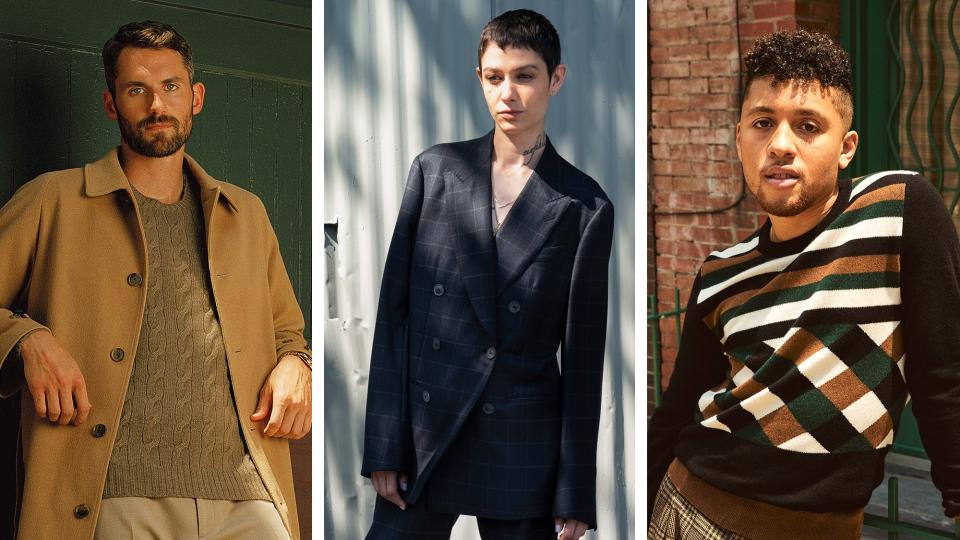Waves Shows the Power of New Masculinity
In our recent “Voices of the New Masculinity” package, the author and video producer Liz Plank talks about a revealing social experiment she conducted. Plank went around Washington Square Park asking men, “What’s hard about being a man?” Perhaps unsurprisingly, there was a lot of Uhh…well…hmm. “They just froze,” Plank says. “And you could tell that not only did they not necessarily feel that it was safe to share that, they’d also never thought about it.”
Plank’s experiment came to mind after I watched Trey Edward Shults’s flooring new high school drama, Waves. Though it’s a film about a lot of things—love, coming-of-age, family, tragedy, Blackness—the modern male experience is always floating to the surface. Waves moves in the style of its title—following a popular high school wrestler named Tyler (the budding superstar Kelvin Harrison Jr.) and then his more reserved sister, Emily (the equally excellent Taylor Russell). But even as a second protagonist laps the first, the male perspective remains (it’s a highly personal story written by Shults with heavy input from Harrison). And I imagined that the men Shults and Harrison created—Tyler, as well as his father, Ronald (Sterling K. Brown), and Emily’s boyfriend, Luke (Lucas Hedges)—would have been similarly unable to articulate what’s hard about being a man.
But not for lack of difficulties. The first half of Waves finds Tyler wading through a series of increasingly strong currents. Though he’s sensitive by nature (he dyes his hair blond, listens to Frank Ocean, and is a sweet lover and son), his overbearing father pushes him relentlessly toward an outdated standard of masculinity. Ronald acts as Tyler’s personal trainer and demanding boss, and in each capacity he coaches physical strength and mental discipline. The most tender moment between them comes after church, when they arm-wrestle in a diner; even then, love comes in the form of a contest. “We are not afforded the luxury of being average,” he tells Tyler at one point, explaining why he pushes him so hard. He, of course, is talking about being black. But more specifically, he’s talking about being a black man. Tyler’s father, after all, barely pushes his daughter.
Don’t get the wrong idea, though. Waves isn’t some sort of men’s-rights movie. It doesn’t harp on the difficulties of being a man so much as it illustrates the ways those difficulties can compound and lead to terrible consequences. As Manohla Dargis notes in her review, “In the first half, Shults keeps close to Tyler, creating a palpable intimacy — the director of photography is Drew Daniels — that locks you in with the character, his upper-middle-class home and larger world.” Because of that closeness, we viscerally feel the pressures Tyler feels. Shults simulates the persistent tension of being a teenage boy with a developing frontal cortex and gushing hormones, and specifically in this particular moment.
When Tyler’s phone buzzes with bad news and missed experiences, the panic is palpable. But the movie’s most electric moments come when its teenagers are driving. Shults likes to put the camera in the middle of the car and turn the automobile into a virtual Gravitron: It spins, creating a sort of weightless terror. With music blaring and a friend (or lover) in the passenger seat, you’re not cruising; you’re flying. The anxiety that you might fly off the road only adds to the ecstasy. In high school, cars will set you free—well, either that or kill you.
That soaring sensation is what Tyler’s after. There’s a flicker of it when he pins an opponent, or when he gets an intimate Snap from his girlfriend, or when he makes love in the ocean. When things are going well, there’s the sense that the punch-drunk spinning can go on and on, forever. The movie is set in South Florida, and usually the clouds seem like no match for the bright, glowing sun. Tyler’s taught to covet control, and when things are sunny, there’s the illusion of it.
But, of course, complete control is impossible. Eventually, Tyler’s life comes crashing in on itself. And because of the way he’s raised, he responds with muscle and aggression. He takes his father’s pain meds to push through injury. He viciously yells at his girlfriend when she changes her mind about a critical decision. And ultimately, he lets his physical strength get the best of him. I won’t give away any specifics, but suffice it to say strength fails Tyler, just as it fails his father—and it fails them in ways that can’t be undone.
At that point in the story, though, the tide recedes, and the brilliant next chapter begins. If the first half of Waves rumbles toward tragedy, the second half drifts toward reckoning and some semblance of redemption. Introspection leads Ronald to vulnerability and, ultimately, empathy. He lets down his shield and cries on his daughter’s shoulder. He tells her that a person is more than their mistakes.
And later, when Emily accompanies her boyfriend, Luke, on a journey to make peace with his own dying father, the two of them absorb the power of forgiveness. Though it doesn’t dazzle like speeding on the highway to the tune of Animal Collective’s “FloriDada,” it’s actually liberating. Waves is bookended by the image of a girl on a bicycle, and by the end the girl is able to ride with no hands. Empathy reverberates.
Frank Ocean, an excited camera, and incredible young actors help make Waves this generation’s Dazed and Confused.
How masculinity is morphing and modernizing, according to 18 influential people who are shaping our culture now.
To find out how perceptions and behaviors are shifting, we polled 1,005 Americans who identify as male, female, or gender nonbinary, asking them some pretty wide-ranging questions about what they see and how they feel.
Originally Appeared on GQ




